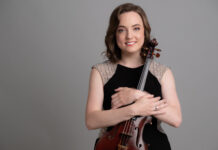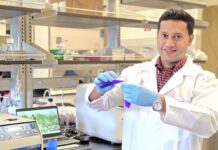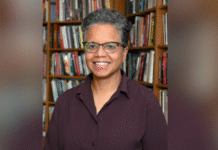MACON – Mercer University School of Engineering on May 21 presented its latest version of Touch3D Yearbooks to the graduating class at Macon’s Georgia Academy for the Blind (GAB).
The 3D yearbook project was initially conceptualized by Dr. Sinjae Hyun, professor of biomedical engineering, in late 2016 and has been developed over the years with help from Dr. Scott Schultz, professor of industrial engineering, and dozens of Mercer students.
“When I began to teach 3D scanning and printing with students, we thought is there any way we can help the community with this technology,” said Dr. Hyun.
“I wanted to go into engineering because I love creating, but I also really want to help people,” added Olivia Kight, who received her bachelor’s degree in mechanical engineering in May. “This is an amazing opportunity to use these skills to make such an impact and difference.”
The implementation of the yearbook project at Georgia Academy for the Blind arose from a chance encounter between Dr. Hyun and Mary Keith during a Mercer event. Keith, who serves as teaching and learning innovative programs coordinator at GAB, is the spouse of Dr. David Keith, dean of Mercer’s School of Music.
After discussing the project with Keith, Dr. Hyun met with Dr. Cindy Gibson, superintendent of GAB, who was enthusiastic about getting the yearbook into the hands of her students.
“Our students are people with visual impairment who are functioning in a sighted world. This levels the playing field just a little bit,” said Dr. Gibson.
The concept of the Touch3D Yearbook is simple, explained Safi Rahman, who received his bachelor’s degree in mechanical engineering in May. “It’s a wooden box that contains a face model of each student and the name underneath (in braille). The student can feel the facial features of each model and notice whether it’s them (or other classmates).”
The recent visit to GAB by Dr. Hyun, Kight, Rahman and Samantha Scholz marked the third time Touch3D Yearbooks were presented to the Academy’s students and the fourth consecutive graduating class to receive the keepsakes. This year’s presentation was made to the Class of 2021 as well as the Class of 2020, since the COVID-19 pandemic put a halt to last year’s plans for a similar event.
Touch3D Yearbooks have been delivered to a total of 38 GAB students since it was first introduced to the Class of 2018. New iterations of the yearbooks have been designed and produced by Dr. Hyun’s and Dr. Schultz’s classes as circumstances have changed over the years, providing students with valuable teaching moments regarding how engineering projects are conducted outside the classroom.
“This project – from design to production – illustrates the entire engineering process,” said Dr. Hyun.
Between the first and second years, an increase from seven to 11 graduating seniors required a change in the time-intensive process of 3D printing each of the head molds for each of the yearbooks. The professors developed a new process of 3D printing one of each head molds from which they could create silicone molds and cast duplicates. This resulted in shortening the process from three months to only eight hours. The display also had to be redesigned from a single wooden panel to a hinged wooden case to accommodate for the larger Class of 2019.
While the third class of students to receive the yearbooks saw another increase to a total of 17 graduating seniors, the design remained largely the same. However, with this year’s class totaling only three students, the opportunity arose for further innovation. The Class of 2021 was the first to receive Touch3D Yearbooks that include an audio component, adding another level of sensory experience.
“With each rising senior class, it is carried down that this is now part of our tradition,” said Dr. Gibson. “They look forward to their photo day, and they look forward to a 3D image of themselves. Now they can look forward to delivering their own message to the world.”
Scholz and Adam Steinberg, both rising seniors majoring in computer engineering, researched and developed the new feature, which uses conductive paint and capacitive touch technology to play each student’s “senior quote” as their face is touched. Capacitive touch is the same technology used on touchscreen devices wherein a circuit is completed at the point where the skin contacts an object. The completed circuit produces an output coded by Scholz and Steinberg to queue up the audio file associated with each student’s head mold.
“It was an amazing experience to learn a new technology and use the circuits knowledge that I’ve gained in labs and class to actually build a product and then to get to see the response of that product being used,” said Scholz.
Over the past four years, the yearbook has taken on important meaning at GAB, according to Dr. Gibson.
“Our families love having their yearbooks as a testament to our dedication to their children and the fact that once you walk through these doors you are always a part of this family and we will always remember you and welcome you back,” she said.
The project also holds a special place in the hearts of the Mercer professors and their students.
“Being able to present the yearbook and see the students’ reactions makes all the time put into it absolutely worth it because you just see the joy on their faces and the genuine impact it has,” said Kight. “I’m amazed and so grateful to be a part of this project.”
The Touch3D Yearbook project has also been incorporated into the Mercer On Mission (MOM) trip to South Korea. In addition to teaching English and robotics to children at a local school, MOM team members created 3D head molds and family photos at a nearby center for the blind in the summer of 2018 and 2019. Planning is underway to resume these activities in the summer of 2022.
About the School of Engineering
Mercer University’s School of Engineering, founded in 1985, offers innovative and academically challenging programs that provide students with a comprehensive education, featuring a solid foundation in mathematics and sciences, a core engineering curriculum, a range of courses in engineering specialties and a strong emphasis on communication technologies. The School is consistently ranked by U.S. News & World Report as one of the top three master’s-degree-level engineering schools in the Southeast. Known for its breadth of instruction in its undergraduate program and its five-year joint bachelor’s and master’s degree program, the School combines technical education with hands-on laboratory experience. Mercer engineers can look forward to joining fellow alumni in companies such as Robins Air Force Base, Mercer Engineering Research Center, Northrop Grumman, Georgia Power, Manhattan Associates and Gulfstream Aerospace.









